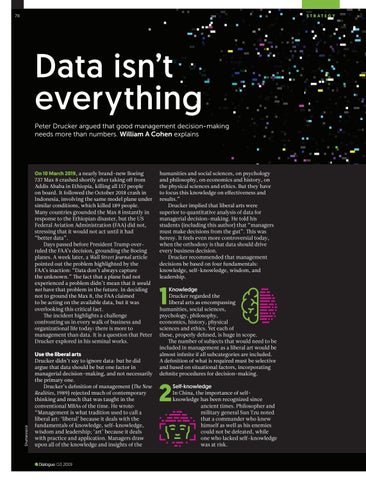STRATEGY
78
Data isn’t everything Peter Drucker argued that good management decision-making needs more than numbers. William A Cohen explains
On 10 March 2019, a nearly brand-new Boeing 737 Max 8 crashed shortly after taking off from Addis Ababa in Ethiopia, killing all 157 people on board. It followed the October 2018 crash in Indonesia, involving the same model plane under similar conditions, which killed 189 people. Many countries grounded the Max 8 instantly in response to the Ethiopian disaster, but the US Federal Aviation Administration (FAA) did not, stressing that it would not act until it had “better data”. Days passed before President Trump overruled the FAA’s decision, grounding the Boeing planes. A week later, a Wall Street Journal article pointed out the problem highlighted by the FAA’s inaction: “Data don’t always capture the unknown.” The fact that a plane had not experienced a problem didn’t mean that it would not have that problem in the future. In deciding not to ground the Max 8, the FAA claimed to be acting on the available data, but it was overlooking this critical fact. The incident highlights a challenge confronting us in every walk of business and organizational life today: there is more to management than data. It is a question that Peter Drucker explored in his seminal works.
Shutterstock
Use the liberal arts
Drucker didn’t say to ignore data: but he did argue that data should be but one factor in managerial decision-making, and not necessarily the primary one. Drucker’s definition of management (The New Realities, 1989) rejected much of contemporary thinking and much that was taught in the conventional MBAs of the time. He wrote: “Management is what tradition used to call a liberal art: ‘liberal’ because it deals with the fundamentals of knowledge, self-knowledge, wisdom and leadership; ‘art’ because it deals with practice and application. Managers draw upon all of the knowledge and insights of the
Dialogue Q3 2019
humanities and social sciences, on psychology and philosophy, on economics and history, on the physical sciences and ethics. But they have to focus this knowledge on effectiveness and results.” Drucker implied that liberal arts were superior to quantitative analysis of data for managerial decision-making. He told his students (including this author) that “managers must make decisions from the gut”. This was heresy. It feels even more controversial today, when the orthodoxy is that data should drive every business decision. Drucker recommended that management decisions be based on four fundamentals: knowledge, self-knowledge, wisdom, and leadership.
1
Knowledge
Drucker regarded the liberal arts as encompassing humanities, social sciences, psychology, philosophy, economics, history, physical sciences and ethics. Yet each of these, properly defined, is huge in scope. The number of subjects that would need to be included in management as a liberal art would be almost infinite if all subcategories are included. A definition of what is required must be selective and based on situational factors, incorporating definite procedures for decision-making.
2
Self-knowledge In China, the importance of selfknowledge has been recognized since ancient times. Philosopher and military general Sun Tzu noted that a commander who knew himself as well as his enemies could not be defeated, while one who lacked self-knowledge was at risk.
